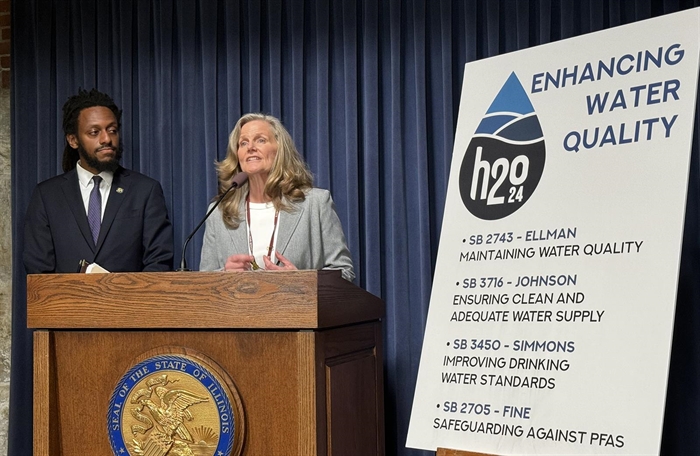SPRINGFIELD – Lake Michigan is Illinois’ largest drinking water supply, serving almost 6.6 million people in the state.
Legislators including Sen. Laura Ellman, D-Naperville, are working to increase research and monitoring of Illinois’ water resources, including the lake.
“Just note with climate change, more and more states will grapple with greater and greater challenges,” Ellman said in a news conference Wednesday. “And Illinois is very well positioned for safe water as long as we remain good stewards.”
Ellman was part of a group of legislators highlighting four water-focused initiatives at a Capitol news conference Wednesday. Two of the bills focus on increased research and reporting of water quality in the state.
Ellman sponsored Senate Bill 2743, which would require the State Water Plan Task Force to meet every three months and publish a new State Water Plan including critical issues and recommendations every 10 years. Senate Bill 3716, filed by Sen. Adriane Johnson, D-Buffalo Grove, would require the Illinois Environmental Protection Agency to regularly monitor the water quality of Lake Michigan and to publish an executive summary every two years. Both measures await a vote from the full Senate.
Sen. Mike Simmons, D-Chicago, and Laura Fine, D-Glenview, focus on contaminants in drinking water. Simmons’ Senate Bill 3450 would establish maximum levels of certain contaminants in drinking water, creating a state standard like the levels set by the U.S. EPA.
Senate Bill 2705, filed by Fine, would ban the sale and distribution of certain products that contain intentionally added PFAS, otherwise known as “forever chemicals,” starting in 2025. All other products containing PFAS would be banned by 2032 unless the product cannot be made without the chemicals. Senate Bills 3450 and 2705 both await a committee assignment.
Free school meals
New legislation unveiled on Tuesday aims to provide state-funded breakfast and lunch to all public and private K-12 students in Illinois, fulfilling a law that was passed in 2023 but never financed.
Sen. Laura Ellman, D-Naperville, introduced Senate Bill 1931, which would allow the Illinois State Board of Education to reimburse school districts the full cost of the free meals at an anticipated price of $209 million. Ellman sponsored separate legislation allocating the funding, but what amount of money, if any, is allocated will be decided during the state’s budgeting process.
Ellman said meals provided under the program are required to meet national nutrition requirements, which “contain nutritious foods like fruits, vegetables, whole grains and lean protein.”
“Research shows that students who eat school meals eat more healthy foods than those who do not eat school meals,” Ellman said at a news conference.
Senate Bill 2209, introduced by Sen. Christopher Belt, D-Swansea, would create a grant program offering up to $7,500 in grants to select schools that provide free breakfast to students once the school day has begun.
“And it allows students to be able to grab something in the classroom, some form of breakfast in the classroom, to help take away a growling belly or to give them energy that they so deserve,” Belt said.
Students who qualify for reduced-price breakfast or lunch options would receive meals under this program for free. The measure would also need further funding approval from lawmakers.
Education poll
The Illinois Education Association – the state’s largest teachers union – on Tuesday released the results of its annual “State of Education” report.
A statewide poll included in the report surveyed 1,000 Illinoisans from Jan. 22-25, finding that 65 percent of respondents think funding for public schools should increase, up nine points from the year prior. Of the current public-school parents polled, 73 percent said public school funding should increase.
When asked to give a letter grade to the nation’s public schools, respondents were more likely to give a lower grade this year than in past years. Just 3 percent said they gave the nation an “A” grade this year compared to 6 percent last year.
When asked about their local schools, however, Illinoisans gave an overall higher grade, with 14 percent giving an “A.”
“What all this should tell us is that public education is a very important issue to the people of this great state, and they don’t want the status quo, they want better for our students, teachers, faculty and staff,” IEA President Al Llorens said in a news release.
The survey also asked Illinoisans whether they favor or oppose certain policies, such as banning books in school libraries. A majority, 76 percent, of respondents oppose the practice.
While majorities of respondents said they support Illinois high schools teaching about the history of slavery and racism in the United States, they were split on whether they would support a state law that “bans the teaching of critical race theory” in schools. Of the respondents, 38 percent were supportive, 37 percent were opposed and another 14 percent responded they did not know.

